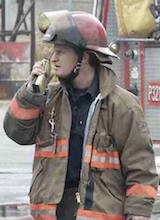Rob Feeney - Profiles of Program Completions
Rob Feeney spent 24 years with Toronto Fire Services – 10 years on the trucks and another 14 in the training division. He was a member of the first international team to provide support services during the World Trade Center rescue and recovery operations.
In April 2015, he retired as the District Chief of Recruit Induction and soon after began the detoxification program. He describes his exposures, their effects and his recovery.

“When I was on the trucks, even though we had breathing apparatus there was still a tendency to think that if you could see you didn’t need to have it on anymore. That is probably not a good idea; we know that now. To this day, to be honest, a lot of people will ditch the breathing apparatus as soon as they feel that they don’t need it anymore. It’s usually far sooner than they should.
The one biggest exposure that I’ve had was going down to the World Trade Center and being right on site for about 16 hours a day for the 7 or 8 days that we were there. The fires were still burning underground underneath the rubble – at night you could see the vapors coming up from underneath the ground. We didn’t feel like we could wear any kind of protective gear because at that point nobody else on site was wearing it. When you’re trying to engage people and get a feel for how they’re doing emotionally, you can’t wander around with a breathing apparatus on. You don’t want to look like an insect. We made a conscious choice that we probably were not going to be wearing any protective equipment while we were working with the firefighters down there. Logistically, it would have been impossible to supply equipment, anyway with the numbers of people that were working and the sheer volume of time. It wouldn’t have helped us do the job we were there to do.
I remember when we were down there a lot of people were complaining that they were getting a dry cough and things like that. I didn’t have any symptoms of any kind, either emotional or physical, until a good 3 months or so after we came back. Then I noticed that I was getting a dry cough that wouldn’t go away. I constantly felt that I had a wheeze. Then gradually, over the next several years, I found myself starting to have these episodes, very intermittently. The first one was in February 2002. I took myself to the emergency room at the hospital at about 2:00 in the morning because my breathing was so tight that I couldn’t sleep. I asked them if they could give me something, but I went home and had a sleepless night and just went on with my life.
This started to happen more often. By about 2008 or 2009 I was noticing myself slowing down a lot at work. One of my responsibilities with the recruits was assisting with the fitness component of their training in the mornings. Traditionally, I would be the one that was able to push them and keep up with them and not have any trouble telling them when they were being slow. I gradually found that I was not able to do that anymore. I had less and less stamina, less and less ability to do that part of the job. It got to the point where I wasn’t even changing into fitness gear anymore. By 2010, I was just standing there and making sure they were doing what they were told.
Around the end of 2011 I would have days when was too exhausted to go in to work. That came to a head in 2012. I was doing some work out on the fire ground. I was much too tired to be doing it. I had no stamina, no energy. I was doing a simple task that I had been doing for the last 20 years of my career and I had a fall and ripped tendons in my shoulder. That put me out a commission for a while but I didn’t feel like I was getting any energy back by having this time off to rest.
One thing led to another and I ended up in a situation where I just couldn’t work anymore. I was starting to have episodes where I would, with no exertion, suddenly find myself with a sense that there was no air in the room. No matter how deeply and how hard I breathed, I just felt like I wasn’t getting any air. Periods of disorientation would come along with this. There would be times that I would have to pull over in the car and wait for it to pass because I couldn’t figure out what to do next when I was driving. I ended up leaving work on long-term disability at the end of 2012; I’d have 2 hours out of a day and I was done.
My general practitioner spent the last 4 years or so trying to research this and find out what was wrong with me. He was coming up with things like fibromyalgia. That was the bottom line. He found out about a respiratory clinic downtown in Toronto, specifically for people with environmental exposures. He hooked me up with Dr. Kathleen Kerr, who is involved in a study of Gulf War vets and, I believe, 9/11 fire fighters and emergency service workers who were getting this treatment. As soon as she saw me, she said, “I know exactly what’s going on. I know just what we can do.” She hooked me up with the clinic in Annapolis and arranged for me to get down there as soon as I was able.
I feel like I got 10 years of my life back. I will tell you that right now. I still have a bit of a respiratory problem. There is some physical damage there that’s not going to go away. My stamina level, my energy levels and everything like that, are better than they’ve been in a long time. It’s been since about 2002, 2003 since I’ve felt the way I’m feeling lately.
I had a couple of days when I was noticing a grayish tinge on the towels, which was weird. I’d been told I might expect something like that, but it was surprising to actually see it happen. There were a few days where I could smell the smell of a house fire coming out of myself. I haven’t been in a real house fire since 1999. I don’t know how many other stories like this you’ve heard, but the smell of a house fire is a very different animal. There’s a lot of stuff burning that is not supposed to be burning: plastics, synthetics, things like that. That smell is quite unique. To have that actually coming out of my pores 14, 15 years after the fact, that really opened my eyes.
There were days that I could smell tobacco in the room. I’m a nonsmoker and always have been, but I have been surrounded throughout my career by people who did smoke. We have “no smoking” bylaws all over Toronto now, so the last time I would’ve been exposed to enough cigarette smoke to have that actually get in to me is 5 or 6 years ago at least. There were days that I could smell something like the smell of a campfire. Just a normal wood burning fire, with hardwood. Whenever we would have a class of recruits, there would be a cycle of 3 weeks when we would be spending 6 to 8 hours a day for about 3 weeks in fires that we light ourselves; interior attacks training. To smell that coming out of my pores as well was really bizarre.
I’m still trying to find out how much I can tolerate in a day and still pushing myself to see what I can do and what I can’t.
I feel like I’ve been given the green light to go ahead and have a life again, quite frankly.”



